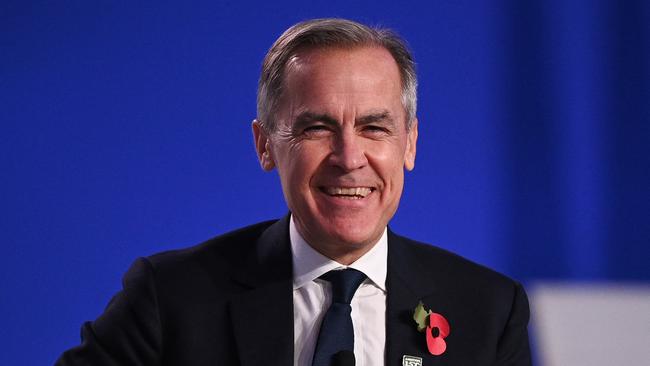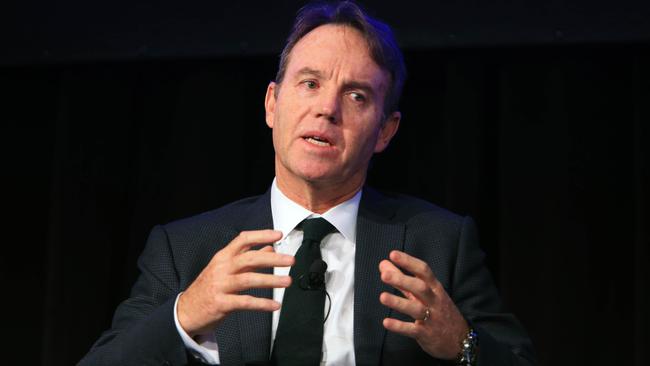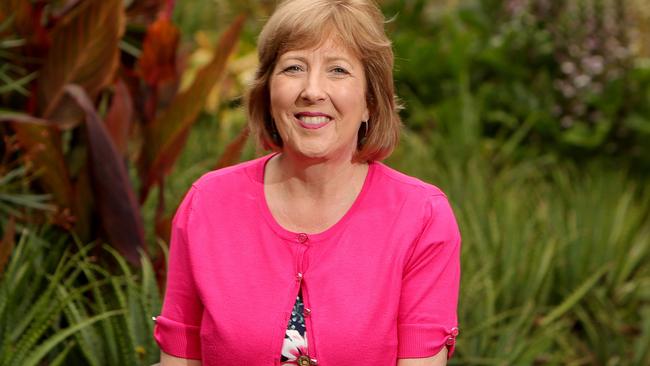Former Bank of England governor Mark Carney takes at deniers who believe coal has a future
Ex-central banker Mark Carney says Australia must accelerate its exit from coal and tackle issues plaguing the country’s potential in renewables.

Climate change power brokers have dramatically laid out the scale of the nation’s transition challenge, saying Australia needs to accelerate its exit from carbon-intensive coal and has only 10 years to dismantle and replace a fossil-fuel economy which took a century to build.
Former Bank of England governor Mark Carney told an investor conference in Melbourne that the country has to burnish its climate credentials to succeed in its bid to host the Cop 29 conference in 2024.
Mr Carney, who now commands a $21bn investment war chest for new energy projects through Brookfield Asset Management, said hosts of the United Nations climate conference had were required to focus on the global transition challenge, not just local or regional issues.
“I’d go to the issues which plague Australia’s many strengths, including accelerated transition from coal generation”, he told the conference, hosted by the Australian Council of Superannuation Investors.
“If we don’t get going collectively on this, we as a world are not going to make it, and we need to lead in the advanced economies.”
Mr Carney took aim at deniers who believe that coal has a future, saying the sooner it was recognised by governments, companies and investors that coal would be phased out, the sooner the adjustment and retraining of workers could occur.
Australia could then concentrate on the “absolutely extraordinary potential” of its renewables industry, which was only beginning to be realised.

In a later panel discussion, former APRA executive board member Geoff Summerhayes foreshadowed four new regulatory priorities, including an expectation that institutions would become actively involved and help fund the required investment to decarbonise the economy.
“We’ve taken 100 years to build a fossil-fuel economy,” Mr Summerhayes, who is now a company director and senior adviser at climate consultancy Pollination, said.
“We’ve got to dismantle and replace that in 10 years with renewables.”
More demanding targets for indirect, Scope 3 emissions in companies’ value chains would also emerge, as would greater consistency in climate taxonomies, or data and metrics.
Finally, Mr Summerhayes warned that natural capital and biodiversity, often grouped with climate change as the twin crises, was “coming at you really quickly”
“TNFD – the Taskforce on Nature-related Financial Disclosures – is coming, and if you’re not across that you need to be,” he said.
“Whatever the climate problem is, nature is more often than not the solution.”
Mr Summerhayes said Australia was “incredibly well-placed”, with the opportunity not only to slash emissions but to capture carbon as well through natural processes.
Nature, he said, would follow the climate playbook but in a more accelerated way by orders of magnitude.
The Labor Party pledged in the election campaign to bid for hosting rights for the Cop 29 climate conference.
Hosting a UN framework convention on climate change would send a clear signal of Australia’s intention to participate in multilateral efforts to keep global warming below 1.5C.
While the previous Morrison Government emphasised the nation’s leading LNG industry and its number-two global ranking in thermal coal, Labor is keen to repair relations with regional neighbours where climate change looms as an existential risk.
It has proposed legislation to cut emissions by 43 per cent from 2005 levels by 2030, and to achieve net zero emissions by 2050.

Despite the more demanding target, Fiona Reynolds, former chief executive of the UN Principles for Responsible Investment, told the conference that a 43 per cent reduction fell short of what was required.
“We really need to take the last 10 years, put it in a box over there and forget about it, and we need to move on and stop having arguments about it,” Ms Reynolds said.
“But we also need to remember that over the last two decades we’ve also lost a number of prime ministers and governments to the climate wars and, as investors and businesses, we can’t let that happen again.
“We must support this transition, even if we don’t think it’s perfect – 43 per cent is not enough but it’s a start and we need to support it otherwise we won’t get anywhere.”
Mr Carney stressed that acting earlier would help workers and communities to participate in a just transition.
Investors were also responsible for the assets that they owned, which included a “tail” responsibility to ensure they were transitioned instead of merely focusing on decarbonisation of the investment portfolio.
Australia, he said, would also have a greater chance of hosting Cop 29 if it concentrated not only on conventional wind and solar storage, but also best practice and policy in hydrogen.
The final issue was helping to broaden the supply of single-source, critical commodities for the expansion of renewables.
“There is huge Australian expertise in mining, global supply chains and helping to broker that in a truly impactful way would make a real difference,” Mr Carney said.





